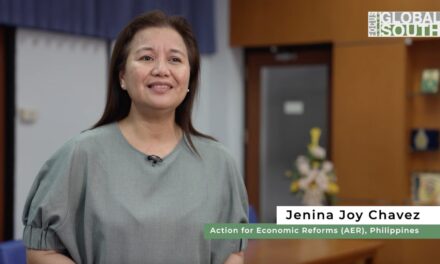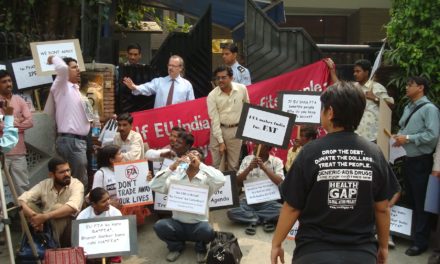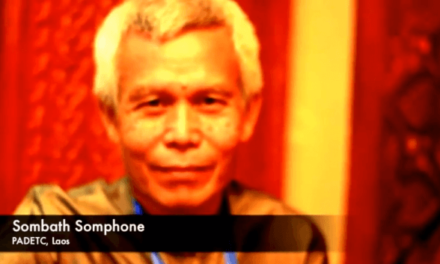By Alec Bamford*
For an anti-capitalist event, the WSF runs on suspiciously free market lines. Apart from the 2-3 events organized by the WSF itself for each time slot, there were 133 other parallel venues. To be filled by an amazing smorgasbord of topics and organizations. From, to take a page of the programme at random, ‘Science and Technology for the Implementation of a New Brazilian National Development Project’ to ‘Strategies of Struggle in Closed Industries’ run by Ginri Kamgar Sangharsh Samiti (you’ve never heard of them either?), to ‘Transit of Venus Mass Experiment’ (housed in Tent C96, so I can’t think the experiment could have been that mass).
So along with Jose Bove, Arundhati Roy and Joseph Stiglitz, you also find people like Mr R P Saraf, proud publisher of Nature-Human Centric Viewpoint Publications, who, very politely, but very persistently, foisted on me a copy of “A Justice-Based World is Possible on the Basis of a Nature-Human Centric Agenda” (available also in Hindi and Punjabi). In other words, there is quite a bit of chaff before you get to any wheat.
And all touting for custom. If the events represent the competitive market-place, the currency in demand is bums on seats. More than one speaker decried the fact that only 30 of more than 100,000 participants had bothered to turn up to what was obviously a presentation of crucial importance (presumably because s/he was giving it). And what does it say for the street cred of an NGO to attract an audience of 300 (plus pigeons) in a disused warehouse capable of seating 2000? Better perhaps to pack 250 in a sackcloth and scaffolding tent designed for 200. Nothing attracts a crowd more than a crowd spilling out of the doorways.
You could plan your day from the programme that resembled a small telephone directory, but this was only available 2 days after the thing started and required the skills of a dedicated catalogue shopper. There were e-mail blizzards ahead of time for those on the right listservs. But most NGOs attempted to get an audience by means of that carbuncle on the arse of capitalism – advertising. So every wall, tree and post was soon festooned with notices and the dust was littered with thousands of discarded flyers. Could the WSF be a cause of alternative deforestation?
But what if some of the more brazen features of neo-liberalism were borrowed? This is all in the cause of participation and solidarity, is it not? Well, yes, but it depends how much solidarity you can imbibe from yet another stageful of talking heads. And how much participation you can enjoy from the most repeated phrase I heard in the events: “Due to lack of time, we will not be able to take any questions or comments from the floor.” By the end of Day 4, we were all so used to this that when one efficient chair did manage to keep time, the call for questions met with silence. (Apart from the nth drum-banging social movement galvanizing the masses on the roadway outside, that is.)
No, all in all, I think there needs to be some alternative thinking about this alternative event before we can truly call it a World Social Funfair. No, hang on, that’s wrong. World Social Free-for-all. No, that’s not it either. What’s the ‘F’ word? Where’s me dog-tag, it’s on there. Ah, yes. World Social Forum. I’ll try to remember that for next year.
When I won’t go.
* Alec Bamford is the Thailand country director of the Canadian volunteer service, CUSO.









